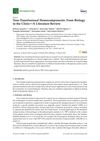 6 citations,
October 2018 in “Lasers in Medical Science”
6 citations,
October 2018 in “Lasers in Medical Science” Low-level laser therapy using near-infrared light may help heart conditions and promote healing by releasing nitric oxide.
[object Object]  1 citations,
April 2024 in “Science Advances”
1 citations,
April 2024 in “Science Advances” Female cuckoo color differences are linked to their unique genes and help avoid male harassment.
 January 2023 in “Bio web of conferences/BIO web of conferences”
January 2023 in “Bio web of conferences/BIO web of conferences” The document concludes that specific dermoscopic features can help diagnose different facial red skin conditions.
 3 citations,
January 2020 in “Clinical dermatology review”
3 citations,
January 2020 in “Clinical dermatology review” Trichoscopy is useful for diagnosing hair and scalp disorders in people with darker skin.
 1 citations,
October 2000 in “Pediatrics in Review”
1 citations,
October 2000 in “Pediatrics in Review” The document says that hookworms are treated with mebendazole and stress-related hair loss usually gets better in 6 months, while other hair loss types have specific treatments.
 3 citations,
May 2018 in “Experimental Dermatology”
3 citations,
May 2018 in “Experimental Dermatology” Young HS patients often have other physical and mental health issues, and research on HS covers a wide range of topics including genetics, triggers, treatments, and the need for more data.
 46 citations,
July 1988 in “Journal of The American Academy of Dermatology”
46 citations,
July 1988 in “Journal of The American Academy of Dermatology” Hormone imbalances can cause specific skin changes, which may help in early detection of endocrine disorders.
[object Object]  September 1998 in “JEADV. Journal of the European Academy of Dermatology and Venereology/Journal of the European Academy of Dermatology and Venereology”
September 1998 in “JEADV. Journal of the European Academy of Dermatology and Venereology/Journal of the European Academy of Dermatology and Venereology” The document concludes that individualized treatments for hair issues are effective, certain hair changes can indicate neurocutaneous diseases, specific lotions improve skin health, laser hair removal works but needs more study on long-term effects, men's cosmetics are diverse, peeling is effective but can have side effects, and facial pigmentation is often due to overactive skin cells.
 7 citations,
December 2011 in “Elsevier eBooks”
7 citations,
December 2011 in “Elsevier eBooks” The document concludes that early diagnosis and treatment are crucial for managing skin diseases in ferrets.
 7 citations,
August 2018 in “South African Medical Journal”
7 citations,
August 2018 in “South African Medical Journal” Clinicians should understand tattoos to manage health issues, as tattoos can cause complications and affect medical assessments.
19 citations,
August 2022 in “Forensic Science International Genetics” The model accurately predicts age from saliva and buccal cells for forensic use.
 April 2023 in “Journal of Investigative Dermatology”
April 2023 in “Journal of Investigative Dermatology” Protein analysis shows aging changes in scalp cell types from women.
 3 citations,
February 2023 in “ACS omega”
3 citations,
February 2023 in “ACS omega” Grape seed oil improved hair quality the most, followed by rosehip and safflower seed oils, and reduced damage from shampoo.
 195 citations,
July 2005 in “American Journal of Human Genetics”
195 citations,
July 2005 in “American Journal of Human Genetics” Genetic variation in the androgen receptor gene mainly causes early-onset hair loss, with maternal inheritance playing a key role.
 49 citations,
February 2019 in “The Journal of Clinical Endocrinology and Metabolism”
49 citations,
February 2019 in “The Journal of Clinical Endocrinology and Metabolism” Use "female pattern hair loss" term, assess androgen excess, treat with minoxidil and other medications if needed.
11 citations,
July 2021 in “Genetics selection evolution” Researchers found genes and genetic variants linked to sheep wool and skin wrinkles.
1 citations,
July 2021 in “Current nanomedicine” The new gel formulation for Acitretin improves topical delivery and reduces oral toxicity.
 16 citations,
January 2011 in “Indian Journal of Dermatology, Venereology and Leprology”
16 citations,
January 2011 in “Indian Journal of Dermatology, Venereology and Leprology” Indian dermatosurgical practitioners were given guidelines in 2011 to reduce infection risks, including hand hygiene, sterilization methods, operation theater standards, and proper waste disposal.
 55 citations,
October 2009 in “Clinics in Plastic Surgery”
55 citations,
October 2009 in “Clinics in Plastic Surgery” Burn reconstruction improves with new techniques, materials, and tissue engineering.
 June 2018 in “International journal of trend in scientific research and development”
June 2018 in “International journal of trend in scientific research and development” The review explains how hair products work and the science of different hair types to help improve hair care research.
 58 citations,
July 2007 in “Clinics in Dermatology”
58 citations,
July 2007 in “Clinics in Dermatology” Tattooing helps treat skin conditions, reconstruct nipple-areola, mark radiation fields, and locate lesions.
 12 citations,
March 2018 in “Bioengineering”
12 citations,
March 2018 in “Bioengineering” The document concludes that products like PRP and PRF show promise for tissue healing, but evidence of their effectiveness is inconsistent.
 4 citations,
February 2011 in “Dermatology reports”
4 citations,
February 2011 in “Dermatology reports” Acitretin can cause excess tissue growth and hair loss.
 41 citations,
March 2007 in “Steroids”
41 citations,
March 2007 in “Steroids” New methods to make oxasteroids show promise for medical treatments like osteoporosis and breast cancer.
 December 2023 in “Journal of Ayub Medical College Abbottabad”
December 2023 in “Journal of Ayub Medical College Abbottabad” Ritlecitinib effectively treats alopecia areata in patients 12 and older with fewer side effects.
 November 2013 in “John Wiley & Sons, Ltd eBooks”
November 2013 in “John Wiley & Sons, Ltd eBooks” The document concludes that accurate diagnosis of male and female gonadal disorders is crucial for effective treatment and better patient outcomes.

A 15-year-old boy's smelly, yellow armpit hair improved with clindamycin treatment.
 January 2009 in “Actas dermo-sifiliográficas/Actas dermo-sifiliográficas”
January 2009 in “Actas dermo-sifiliográficas/Actas dermo-sifiliográficas” Lasers and light treatments are now the most common ways to remove hair.
8 citations,
October 2020 in “Stem cell research & therapy” DNMT1 helps turn hair follicle stem cells into fat cells by blocking a specific microRNA.
 21 citations,
March 2018 in “Experimental Dermatology”
21 citations,
March 2018 in “Experimental Dermatology” The guide explains how to study human skin fat cells and their tissue, aiming to improve research and medical treatments.


























